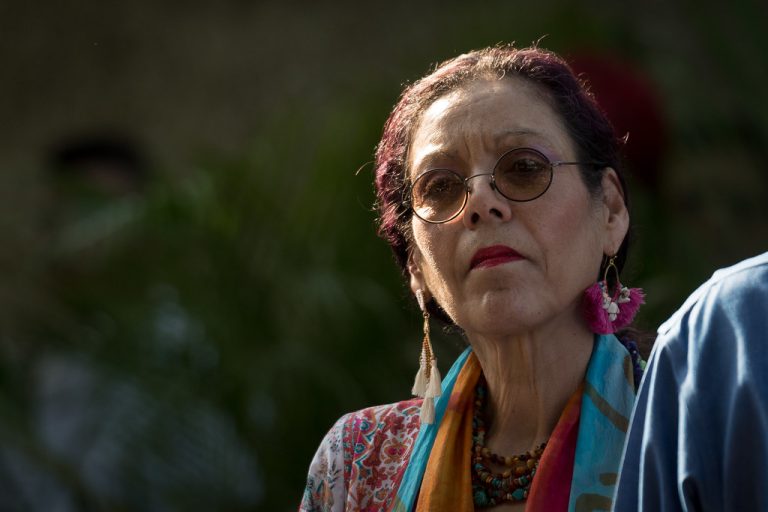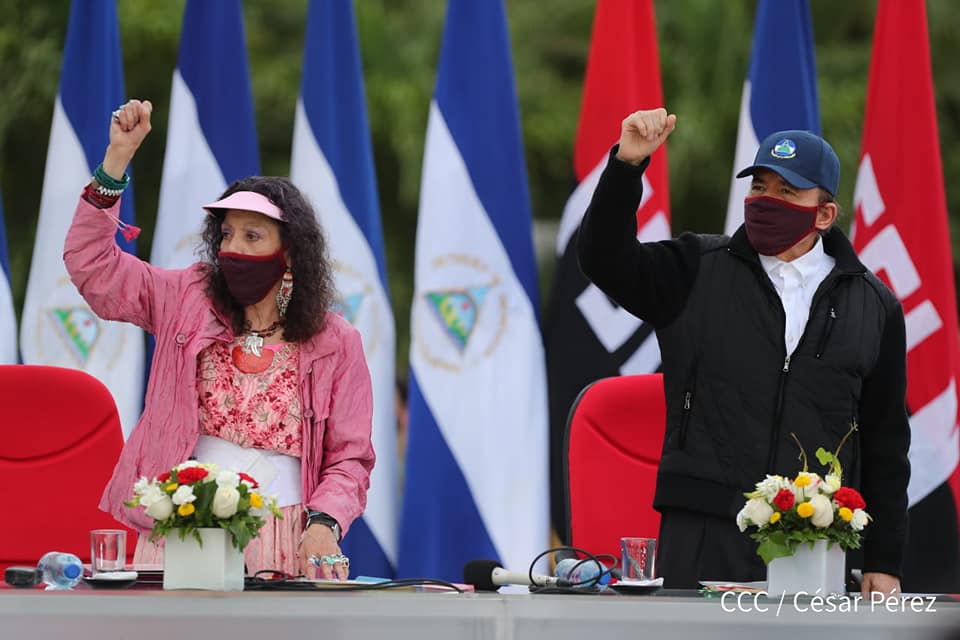20 de septiembre 2020

European Concern over Lack of Academic Freedom in Nicaragua

PUBLICIDAD 1M
PUBLICIDAD 4D
PUBLICIDAD 5D
Ortega calls them “children of the devil”. Murillo adds: “sellouts, straw dolls, scrapings, cigarette butts, criminals, terrorists, ghouls, serpents”.

Ortega calls them “children of the devil”. Murillo adds: “sellouts
Vice President Rosario Murillo has recharged her hate speech against Nicaraguan dissenters. She’s directed special fury against feminist groups that defend women’s rights.
The Ortega-Murillo regime’s new offensive began on Tuesday, September 15, during the act commemorating Nicaragua’s independence from Spain. During his speech, Daniel Ortega referred to the massive 2018 citizen protests demanding that he leave power. He threatened opponents, whose symbol has become the blue and white traditional flag, with life in prison.
“We can’t forget their terrorist practices… How they tortured and burned in April 2018,” Ortega said. He also hurled insults at citizens in the opposition, calling them “cowards, assassins”. “They’re not Nicaraguans, they’re children of the demon, of the devil, and they’re full of hate.”
The crisis that began in Nicaragua in April 2018 still persists. It all began when Nicaraguans flooded the streets in peaceful protest against the Ortega government. The regime responded with brutal repression, spearheaded by police and paramilitary forces. This violent repression left over 300 dead, thousands of wounded, and hundreds of political prisoners. The persecution and the economic crisis forced around a hundred thousand Nicaraguans to go into exile.
International human rights organizations affiliated with the OAS and the UN have condemned the state repression and human right abuses. These were classified as “crimes against humanity”.
Vice President and First Lady Rosario Murillo closed the September 15th act. She added more insults and threats towards those who don’t sympathize with the regime. “We know that nothing good can be expected from one who kneels before the empires. They’re traitors to their country, sellouts, straw men, scrapings, cigarette butts, irresponsible and criminal.”
On Wednesday, September 16, Murillo continued her attacks via her daily noon monologue, broadcast on all the official media. “To alter the peace that the Nicaraguan people cherish, that has cost us so much, is a crime against humanity”.
Both Ortega and Murillo’s speeches emphasized the concepts of “hate crimes” and “crimes against humanity”. These terms echoed those of the Court of Conscience, carried out in San Jose, Costa Rica, the previous week. This tribunal found the regime guilty of crimes against humanity in the form of torture.
This past September 11th, the tribunal heard testimonies from 18 victims who suffered sexual violence at the hands of police and paramilitary. The sexual abuse and rapes occurred during the victims’ detention and confinement in the Nicaraguan jails. Those in the cases studied were illegally and arbitrarily arrested for participating in demonstrations demanding that Daniel Ortega leave power.
“There’s no doubt that the Nicaraguan state committed the crime of torture in the form of the sexual abuse and rape of men and women while in the custody of the country’s police and paramilitary forces.” This was the ruling of the well-respected legal experts and human rights advocates who served as judges. All possessed vast experience in the field of international justice and the defense of human rights. The judges were: Almudena Bernabéu, Alda Facio, Sonia Picado, and Clemencia Correa.
The tribunal’s sentence adds” “Those tortures were committed systematically by State agents against the Nicaraguan civil population. As such, they constitute a crime against humanity.”

Protected by face masks, President Daniel Ortega and Vice President Rosario Murillo preside over the July 19th commemoration in Managua. Photo reproduced from the government website “El 19 digital”.
Ortega and Murillo, in turn, accused the opposition of torture and rape during the 2018 protests. This type of hate speech is termed “mirror accusation”. In it, the victim is accused of the crimes that the perpetrator has committed.
The months of citizen protests in 2018 involved massive marches and roadblocks or barricades set up throughout the country. This was a form of resistance against state repression. Part of the Ortega-Murillo regime’s official discourse has concentrated on painting the demonstrators as criminals. They claim that the opposition committed the very abuses that the regime has been held responsible for. These include sexual violence employed systematically as torture.
The Ortega-Murillo regime now wants to amend the law and the Constitution to include the possibility of life sentences. Ortega justified the change as a possible punishment for the recent femicides perpetrated against young girls in Nicaragua’s Caribbean region. However, immediately afterward, he accused his opponents of committing “hate crimes” that should be punished.
His announcement has worried opposition organizations and human rights advocates. They feel that his true goal is to punish the opposition, which demands an end to the authoritarian regime.
“And they’re still shouting,” Murillo said on Wednesday. “We say to those who want no punishment for crimes of hate, in this blessed and always free Nicaragua: ‘the parties have acknowledged [their crime]’”.
“They want to destroy Nicaragua, the peace, the harmony, the victorious economic processes. Never again. We say to them, categorically: terrorism, never again,” she threatened.
In her September 16th broadcast, Murillo attacked the feminist organizations and advocates for women’s rights. She focused especially on those who demand therapeutic abortion as a reproductive right. Therapeutic abortion is sometimes the only recourse when the life of the pregnant woman is in danger.
Murillo asserted that the Women’s Section’s [specialized offices of the police] were closed in 2016, due to these organizations. Without offering a further explanation, she claimed they “used the women’s police sections to promote those bad practices.”
“We are reopening the Women’s Sections. We’ve been obligated to transition to another model. Why? Because disguised elements got in there, promoting abortions from the offices and the Women’s Sections. We’re denouncing this only now because those who want to end the lives of unborn children dare to speak in the name of women,” Murillo continued.
“We’ve been accused of defending the right to life in the maternal womb. There were those who had the business, clinics, to end the lives of unborn children, under the guise, of course, of a developed culture. They billed themselves as very progressive. In reality, what they are doing is wanting to deny a human being the right to life.”
Since 2006, feminist organizations have been direct and consistent critics of the Ortega-Murillo regime. That was the year of the electoral campaign which preceded Ortega’s return to power. In order to win political support, specifically from the Catholic hierarchy, Ortega supported the ban on therapeutic abortions.
Women’s rights organizations called this a step backward in human rights. Therapeutic abortion was allowed in Nicaragua since the 1837 penal code. “The total prohibition of abortion in Nicaragua puts at risk the life and health of women and children.” This has been the warning of international human rights organizations.
Murillo’s accusations against the feminists came after the latter protested in Managua on September 13th. A group of feminists demonstrated along the Masaya Highway, demanding justice for the increase in femicides in the country. They referred specifically to a horrific crime that occurred on September 12th, outside Mulukuku, on the North Caribbean Coast. The murder of two girls, ages 12 and 10, in the community of Lizawe.
Thirty women came out to protest, despite the de facto police state. Since 2018, protests have been repressed by the police. Shortly after the women initiated their action, two police patrols interrupted the protest. At least one demonstrator was kicked and five were temporarily detained. The rest had their cellphones, protest signs, and scarves grabbed.
The first lady also insulted those dissenters who ask the international community to impose economic sanctions on her regime.
“With pride, vanity, and haughtiness, they go to take pictures with the bosses. To ask them, kneeling, to put an end to Nicaragua, to the Nicaraguan institutions. (..) Robbers, terrorists, liars, hypocrites, sellouts. Bowing down. Those who sport those last names, that all through our history have betrayed and sold out the country. They’re the same. Aaah, now they pretend to be the great democrats. Who are they? Robbers, thieves, criminals, terrorists, ghouls, they’re serpents,” stated Murillo. She herself is one of over 20 Sandinista functionaries hit by the economic sanctions of the US government.
Canada and the EU also sanctioned some Nicaraguan officials for human rights violations. The sanctions are intended to apply pressure. These countries all want the government to accept a peaceful transition and guarantee free and transparent elections. These conditions are seen as the only way out of the ongoing sociopolitical and human rights crisis in the country.
Archivado como:
PUBLICIDAD 3M
Periodista nicaragüense desde 2007, con experiencia en prensa escrita, televisión y medios digitales. Tiene una especialización en producción audiovisual y una maestría en Medios de Comunicación, Estudios de Paz y Conflicto de la Universidad para la Paz de las Naciones Unidas. Fundadora y editora de Nicas Migrantes, proyecto por el cual ganó el Impact Award 2022 del Departamento de Estado de EE. UU. Ha realizado coberturas in situ en Los Ángeles (Estados Unidos), México, El Salvador, Guatemala, Nicaragua y Costa Rica. También ha colaborado con France 24, The Guardian, Al Jazeera, BBC World Service. Ha sido finalista y ganadora de varios premios nacionales e internacionales, entre ellos el Premio Latinoamericano de Periodismo de Investigación Javier Valdez, del Instituto Prensa y Sociedad (IPYS), 2022.
PUBLICIDAD 3D